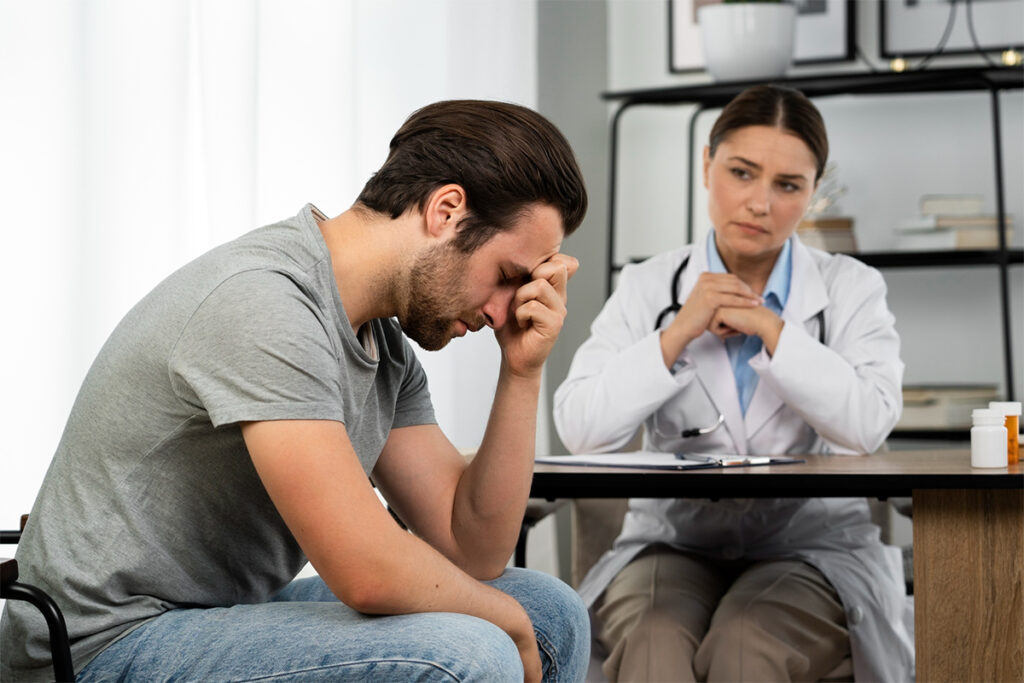What is Emotional Trauma?
Emotional trauma is a silent and invisible wound that can deeply affect individuals who have experienced a distressing or harrowing event. It stems from the overwhelming stress and fear triggered by a traumatic experience, such as a car accident.
Car accidents are one of the leading causes of emotional trauma, as they often involve sudden and unexpected events that can shatter a person’s sense of safety and security.
Survivors may develop post-traumatic stress disorder (PTSD), a psychiatric disorder that manifests in a range of symptoms and can significantly disrupt daily life.
Accident victims may experience intense feelings of fear, helplessness, and horror, leading to an array of emotional distress.
Intrusive memories of the accident, nightmares, and flashbacks can haunt survivors, re-triggering the intense emotional and physical responses experienced during the traumatic event.
The emotional trauma experienced by car accident survivors can greatly impact their ability to function in everyday life. They may struggle to regain a sense of normalcy and may exhibit avoidance symptoms, such as avoiding driving or even talking about the accident.
These symptoms can further isolate survivors, making it difficult for them to seek the support they need.
Post-traumatic stress disorder is a mental health disorder caused by experiencing or witnessing a traumatic event, and it affects around 3.5 million adults each year. It is caused by experiencing or witnessing a traumatic event. The condition affects an estimated 3.5 million adults annually. [1]

How Does Trauma Affect Car Accident Survivors?
Survivors may experience intrusive memories of the accident, in the form of flashbacks or nightmares, which re-trigger the intense emotional and physical responses originally felt during the traumatic event.
Survivors may feel a sense of fear, helplessness, and horror as they relive the moments of the crash.
These emotions can be overwhelming and make it challenging for individuals to resume their normal activities and regain a sense of safety and security.
The emotional trauma experienced by car accident survivors can greatly impact their quality of life and overall well-being. Relationships, work, and personal life can all be affected by the symptoms of PTSD.
Survivors may find it challenging to concentrate, experience changes in mood, and have difficulty sleeping. The constant emotional distress may also lead to substance abuse and other mental health disorders if left untreated.
Motor vehicle accidents (MVAs) are the leading cause of post-traumatic stress disorder (PTSD) in the general population. Each year, there are an estimated six million MVAs in the United States, resulting in over 2.5 million injuries. According to a National Institute of Mental Health (NIMH) study, 39.2% of MVA survivors develop PTSD. [2]
Symptoms of PTSD
One of the hallmarks of Post-Traumatic Stress Disorder is the presence of intrusive memories. Survivors may experience vivid flashbacks of the accident, causing them to relive the intense emotions and physical sensations they felt during the traumatic event.
These intrusive memories can come in the form of recurring, distressing thoughts, nightmares, or even physical reactions like increased heart rate or sweating.
Another common symptom of PTSD is hyperarousal. This includes experiencing a heightened state of alertness and being easily startled. Survivors may constantly feel on edge, making it difficult to relax or feel safe.
Individuals may begin to avoid situations that trigger memories of the accident, such as driving or engaging in conversations about the incident. While avoidance may provide temporary relief, it can lead to isolation and hinder the healing process.

They may also have difficulty concentrating or sleeping, as their minds are constantly preoccupied with the trauma. This hyperarousal can lead to irritability, mood swings, and even feelings of anger or aggression.
Avoidance is another significant symptom of PTSD. Car accident survivors may go to great lengths to avoid reminders of the traumatic event, such as avoiding driving or certain locations associated with the crash.
Survivors of car accidents with PTSD may also experience negative alterations in their moods and thoughts. They may develop a negative outlook on life, including feelings of guilt, shame, or self-blame related to the accident.
Survivors often lose interest in activities they once enjoyed. Emotional numbing and detachment can worsen the quality of life and make it harder to form relationships and enjoy activities.
Causes of PTSD in Car Accident Survivors
One of the primary causes of PTSD in motor vehicle accident victims is the intensity and suddenness of the traumatic event itself. The high levels of physical and emotional distress experienced during a crash can overwhelm the survivor’s ability to cope with the situation.
Survivors may be left feeling shocked, helpless, and out of control. These feelings can contribute to the development of PTSD symptoms in the aftermath of the accident.
The severity of physical injuries sustained during the crash can play a role in the development of PTSD. Survivors who experience more significant injuries may be more likely to develop PTSD due to the physical pain and distress associated with their injuries.
The presence of other psychological factors, such as a history of previous trauma, pre-existing mental health conditions, or a lack of social support, can also increase the risk of developing PTSD in car accident survivors.
Another significant cause of PTSD in car accident survivors is the perception of life-threatening danger during the crash.
Survivors who believe they were close to death or experienced intense fear during the accident are more likely to develop PTSD symptoms.
The fear of re-experiencing a similar event or being involved in another car accident can further contribute to the development and maintenance of PTSD symptoms in these individuals.
It is important to note that not all car accident survivors will develop PTSD. Some individuals may experience acute stress disorder immediately after the accident, which may resolve on its own within a few weeks.

Diagnosis for PTSD
The diagnosis of PTSD typically involves a comprehensive assessment conducted by a mental health professional.
The diagnostic criteria for PTSD, as outlined by the Diagnostic and Statistical Manual of Mental Disorders (DSM-5), include the following:
- Exposure to a traumatic event: This could involve experiencing or witnessing a car accident that poses a threat of death or serious injury.
- Re-experiencing symptoms: Car accident survivors may have distressing recollections, nightmares, or flashbacks of the traumatic event.
- Avoidance: Individuals with PTSD often try to avoid memories, thoughts, or reminders associated with the car accident.
- Negative alterations in cognition and mood: This includes persistent negative beliefs about oneself or the world, distorted blame towards oneself or others, and feelings of detachment from loved ones.
- Hyperarousal: Car accident survivors may experience symptoms such as irritability, insomnia, being easily startled, or having trouble concentrating.
Treatment for Car Accident Survivors with PTSD:
Psychotherapy:
This form of treatment focuses on helping car accident survivors identify, process, and cope with their traumatic experiences. Cognitive-Behavioral Therapy (CBT) is a common approach used to treat PTSD. It involves techniques such as exposure therapy, where individuals safely confront their trauma-related memories and triggers to gradually reduce distress and avoidance behaviors.
Eye Movement Desensitization and Reprocessing (EMDR):
This therapy involves focusing on the traumatic memory while engaging in rhythmic eye movements or other bilateral stimulation. The goal is to desensitize individuals to the distressing memories and reprocess them in a less distressing way.
Medications:
In some cases, doctors may prescribe medications, such as selective serotonin reuptake inhibitors (SSRIs), to help manage symptoms of PTSD. These medications can help with mood stabilization, anxiety reduction, and sleep disturbances.
Support groups:
Joining support groups or engaging in peer support can provide car accident survivors with a supportive community of individuals who have gone through similar experiences. Sharing experiences and coping strategies can offer comfort, validation, and practical advice.
With the right support and care, individuals can work towards healing and finding a path to recovery.

Common Emotional Responses to an Automobile Accident
The mere sight or sound reminiscent of the accident, such as screeching tires or the honking of horns, can trigger overwhelming emotional responses.
The impact of these intense emotions on a person’s daily life can be profound. Ordinary tasks that were once mundane, such as running errands or commuting to work, may now provoke overwhelming anxiety and panic attacks.
Survivors may find it challenging to maintain personal relationships or participate in social activities, as they are constantly on high alert, expecting danger at every turn.
The emotional trauma and subsequent PTSD may also cause physical symptoms. Car accident survivors may experience chronic pain, headaches, or gastrointestinal issues as a result of the intense emotional strain they endure.
These physical ailments, combined with the psychological distress, can further diminish their quality of life, creating a vicious cycle of physical and emotional distress.
Support from friends, family, and the community is vital for the recovery of car accident survivors. Understanding and empathizing with their struggles can make a significant difference in their healing journey.
It is equally important for survivors to take care of themselves by practicing self-care, engaging in stress-reducing activities, and adopting healthy coping mechanisms.
Car accidents should not define an individual’s life, but emotional trauma following such incidents can have a lasting impact if left unaddressed.
Professional Help for Recovery After a Traumatic Event
Trauma can have far-reaching effects on an individual’s mental, emotional, and physical well-being, making it necessary to seek support from trained professionals who specialize in trauma recovery.
Professional help provides a safe and supportive environment for individuals to navigate through the aftermath of trauma. Professional help has the potential to offer the following benefits:
- Expertise: Mental health professionals, such as therapists, psychologists, and counselors, possess knowledge and expertise in trauma therapy techniques. They understand the complexities of trauma and can guide individuals through the healing process using evidence-based approaches.
- Emotional support: Professional therapists can provide a safe space for individuals to express and process their emotions related to the traumatic event. They offer a non-judgmental and empathetic environment, allowing clients to explore their feelings and fears without fear of rejection or misunderstanding.
- Trauma-specific interventions: Traumatic events often affect individuals in unique ways. Mental health professionals are trained in trauma-specific interventions such as Eye Movement Desensitization and Reprocessing (EMDR), Cognitive-Behavioral Therapy (CBT), or Trauma-Focused Cognitive Behavioral Therapy (TF-CBT). These approaches help individuals address the impact of trauma on their thoughts, feelings, and behaviors, facilitating healing and resilience.
- Building coping skills: Trauma can leave individuals feeling overwhelmed and lacking in healthy coping mechanisms. Professional help enables individuals to develop effective skills for managing stress, anxiety, and other trauma-related symptoms. Therapists can introduce strategies to regulate emotions, practice self-care, and engage in grounding techniques to manage distressing triggers.
- Rebuilding a sense of safety and trust: Traumatic events can shatter an individual's sense of safety and trust in the world. Mental health professionals can help individuals rebuild these foundations by fostering a safe and supportive therapeutic relationship. Through this therapeutic alliance, individuals can gradually regain trust in themselves and others.
Here are some common avenues for accessing the support you need:
Therapy:
Individual therapy sessions provide a one-on-one space to work through trauma-related issues. Therapists can tailor treatment plans to meet individual needs and provide ongoing support throughout the healing journey.
Group therapy:
Joining trauma-specific support groups allows individuals to connect with others who have experienced similar traumatic events. Sharing experiences and insights in a group setting can foster validation, emotional support, and a sense of community.
Medication management:
In some cases, trauma survivors may benefit from medication to manage symptoms related to anxiety, depression, or sleep disturbances. Consulting with a psychiatrist or medical professional can help determine if medication is an appropriate adjunct to therapy.
24/7 crisis hotlines:
If immediate support is needed, crisis hotlines are available to provide confidential assistance and guidance. These hotlines are staffed by trained professionals who can offer crisis intervention, emotional support, and referrals to appropriate resources.
By engaging with trained professionals, trauma survivors can access the expertise, support, and tailored interventions necessary to navigate the challenges posed by trauma.
Remember, seeking help is a sign of strength, and it is never too late to embark on a journey toward healing and well-being.

Sources
[1] J.D., C. B. (2022, November 9). PTSD From a Car Accident: Everything You Need To Know. Forbes Advisor. https://www.forbes.com/advisor/legal/auto-accident/ptsd-car-accident/
[2] The Risk of Developing PTSD When You’ve Been in a Car Accident. (2019, November 17). Very well Mind. https://www.verywellmind.com/risk-factors-for-ptsd-following-a-traffic-accident-2797197


